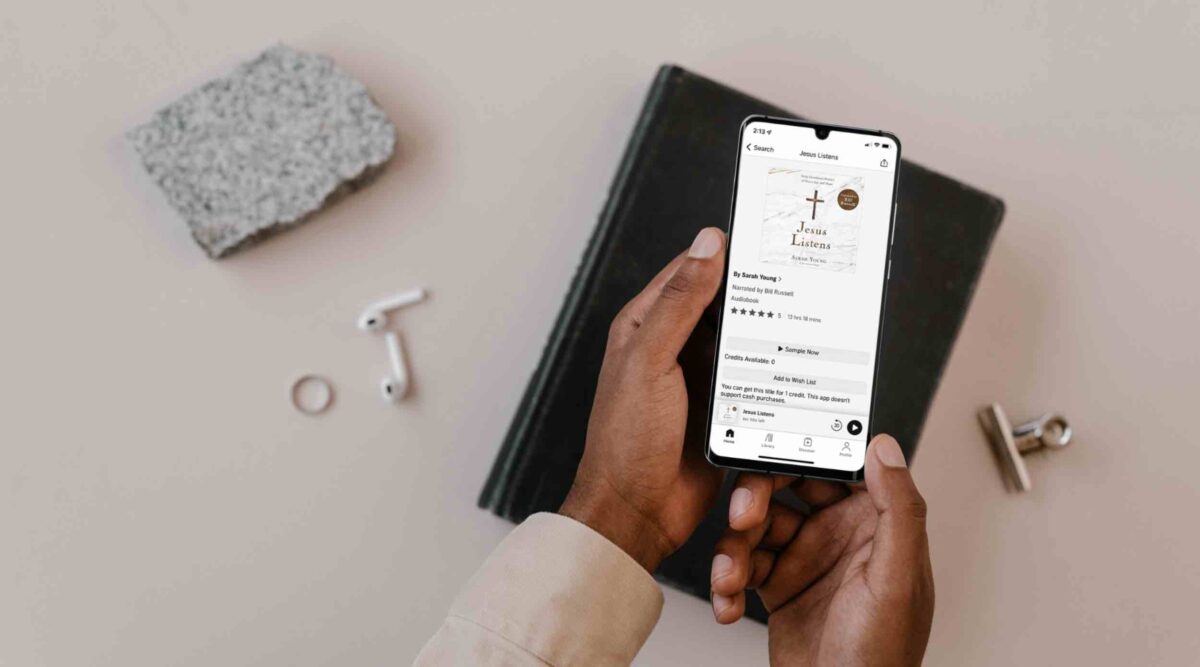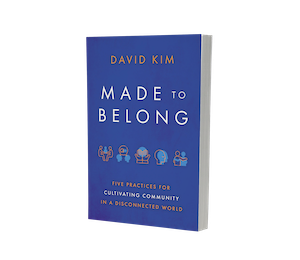True Connection – The Antidote to Loneliness: Walker Zimmerman & David Kim
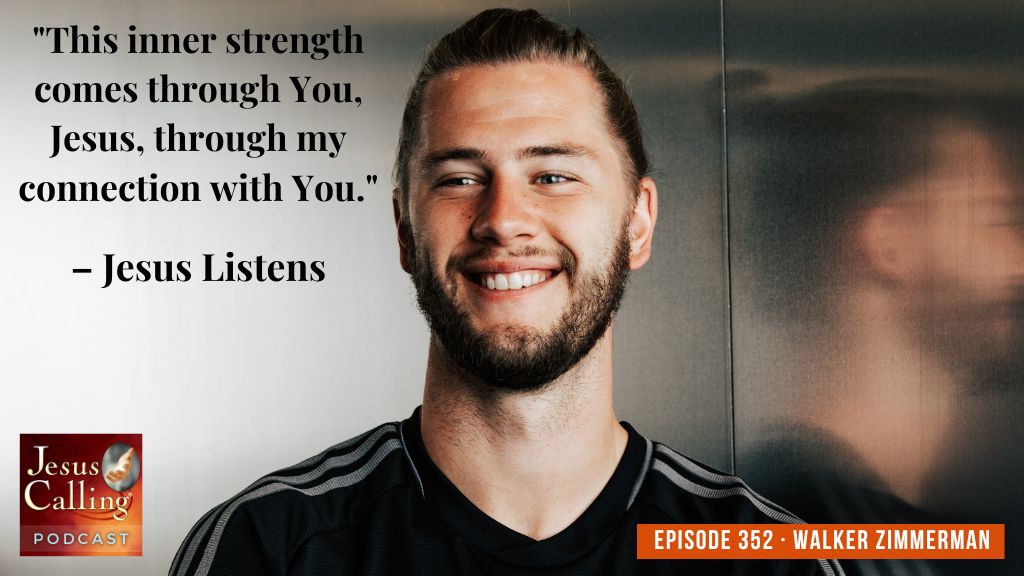
Walker Zimmerman: We want to be in control, want to be masters of our own lives. But there is so much freedom on the other side when you do release those things to the Lord and you trust Him with it. I think a lot of it is, again, understanding that bigger purpose in life. Am I here for me? Am I here for the Lord? Am I here for others? I think when you change your lens from being so much about me, me, me, and all about, Okay, how can I show the world who You are? I think something changes and we’re able to handle those moments in a much healthier and better way.
True Connection – The Antidote to Loneliness: Walker Zimmerman & David Kim – Episode #352
Narrator: Welcome to the Jesus Calling Podcast. In the very beginning of the Bible, God stresses the concept that we were created for community: “The Lord God said, ‘It is not good for a man to be alone.” (Genesis 2:18 NIV) People were designed to better one another, to look out for one another, and to be a support system in good times and bad.
This week’s guests, professional soccer player Walker Zimmerman and author David Kim, are both the sons of pastors—an experience which guided them early on to care deeply about other people, and fostering community. Professional soccer player Walker Zimmerman seeks to be authentically relatable and present in his interactions with teammates, fans, the kids he’s mentoring, and his family. Pastor David Kim’s story of loneliness in his early years shaped his desire to help people find connectedness. He walks us through a five-step system to help us open up to the idea of true connection, even when it feels uncomfortable.
Let’s start with Walker’s story.
Walker: I’m Walker Zimmerman. I’m a defender for Nashville Soccer Club and the U.S. Men’s National Team.
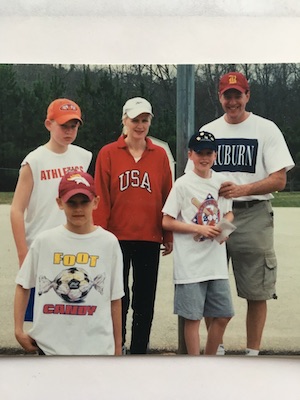
So I grew up in Lawrenceville, Georgia. My dad was a pastor, and so I was a P.K., a pastor’s kid. I had two older brothers, and we were in the suburbs outside of Atlanta.
Being a pastor’s kid, you definitely have a lot of expectations that’s put on you from the outside, from your peers, from your classmates. And so Sundays and weekends looked different for us than maybe some other families. We’d be kind of front pew at the church and there early, you know, playing games on my dad’s computer at like 7:00 before the first service, just kind of going there with him and then staying late while he’s talking to everyone in the congregation. We were making paper airplanes out of the church bulletins and trying to fly across the sanctuary, playing hide and seek in the church. We definitely spent a lot of time there. They had an amazing kid’s program, put on some really cool plays and musicals, that sort of thing. It was a big part of our life growing up.
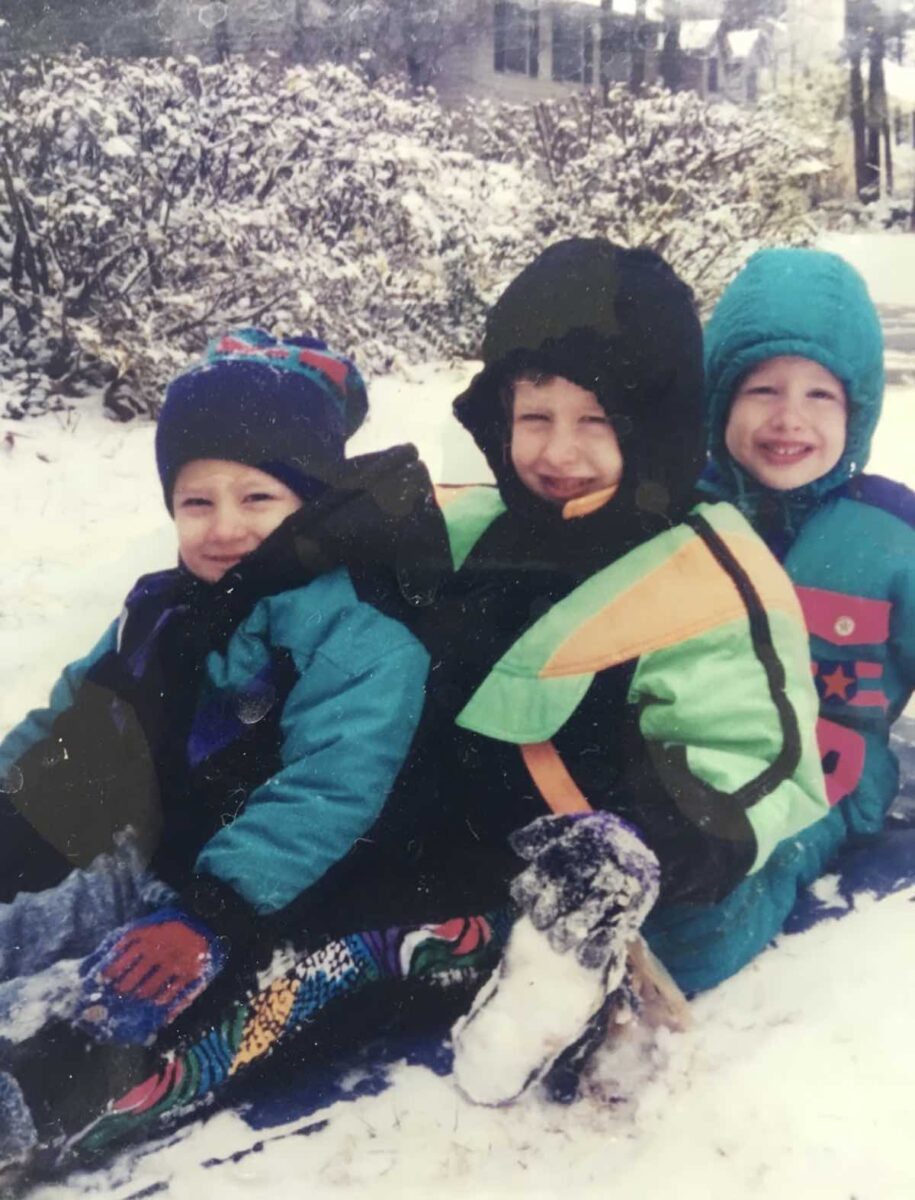
I think one of my biggest passions has always been making other people feel welcome—or trying to bring in different groups of people who might not normally all hang out together—and bringing them together for the same purpose or cause. So even in high school, I remember I had a game night over at our house one time. My parents were great about letting us have whoever over. And I remember looking around the room one game night, and you have like the big classic high school jocks here, people in the band, super academic people, people that would never really meet or hang out on a normal, high school day. And they were all like in our basement playing games together. And it’s pretty unique to be able to try and make connections like that. And people developed some cool friendships from that.
“I think one of my biggest passions has always been making other people feel welcome—or trying to bring in different groups of people who might not normally all hang out together—and bringing them together for the same purpose or cause.” – Walker Zimmerman
Sports As a Way of Life

Growing up, I just loved sports. I loved competing at anything, any type of game. So not only were my two brothers older than me, but everyone else on the street. We had a really athletic street, a lot of guys and girls who went on to play collegiate sports, and they were all older than me. And so I definitely felt like I had something to prove, a chip on my shoulder. They would always be like, “Oh, that was so lucky” and I’d get so mad they were calling it luck. Like, “It’s skill, what are you talking about?”

Just the classic like younger child syndrome. But it definitely paid massive dividends for me and my mentality. And obviously, when you’re pushing against people that are better than you all the time, it’ll help you athletically as well.

Honestly, my brothers were really amazing role models for me. I got to grow up going to all of their sporting games—and they were really good players as well—basketball and baseball and soccer. And so getting to watch them was one of my favorite things to do on the weekend, just because I feel like they would go dominate and I’d be like, “Oh, well, you scored three goals, now I got to go try and score four,” you know? They definitely set the bar pretty high.
And so that made it a pretty easy choice for me. I wanted to be a professional athlete.
Walker Takes Soccer to The Next Level

I started playing soccer when I was four years old. It was the earliest we could get out there on the field, get permission. What was unique about my journey was I played there, the same club, from four all the way through high school, through eighteen. And it’s pretty rare nowadays because you have people always trying to change teams to go to the best team. And I was really fortunate that the club team I was on was at times ranked number one in the country. We won a lot of really big tournaments, went to nationals multiple times.
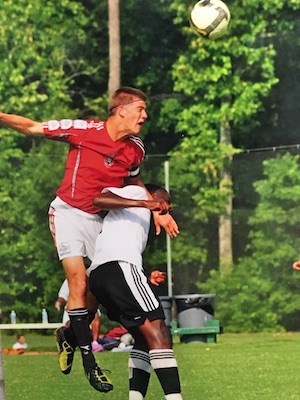
And then I went to Furman University for two years and got drafted after my sophomore season to Dallas, was in Dallas for five seasons. Got traded to LA FC, played two seasons there, and now I’m in year four in Nashville, which is crazy.I think there’s something that is bigger than all of that by a mile. And that’s why are we here? What’s our purpose? And so for me, when I think about soccer and I think about having a bad game, I’m like, Well, my identity isn’t wrapped up in one game or being a soccer player. You know, there’s something that I’m playing for that’s way bigger. I want to honor the Lord with what He’s blessed me with on the field. And so I think that whole concept just kind of puts things into a good perspective for me.
“When I think about soccer and I think about having a bad game, I’m like, Well, my identity isn’t wrapped up in one game or being a soccer player. There’s something that I’m playing for that’s way bigger. I want to honor the Lord with what He’s blessed me with on the field.” – Walker Zimmerman
Walker’s World Cup Experience

I think as an athlete, there are a lot of highs and lows. Lows are often in the form of injury and setbacks. And at the time, you don’t understand why. So a lot of times I’ll have an injury and I’ll be super frustrated. For example, I had a lot of hamstring trouble early on in my career, both sides, and it kept me out most of my rookie year. I feel like I was only available for a handful of games.
But then I look at the flip side of that and I learned so much about my body, about nutrition, that hopefully the longevity of my career is affected by those setbacks early on.
So those are examples of taking things that at the time seem disappointing or not fair, and kind of flipping the script and saying, “I’m growing from this, I’m enduring this process, but it’s making me a better person, a better coach, a better player, etc.”

I think to make it to a World Cup, there’s been some significant amount of resilience that each player has had to go through in whatever form, whether it’s injury, whether it’s mental, physical. But I think that’s what makes it special is having all those things happen and you still get to where you wanted to be.

You know, the World Cup was amazing, just from the standpoint of the camaraderie of the group, the appreciation for hard work, and really the appreciation of all the sacrifices from every single player’s friends, families, whatever their inner circle was. There’s so much that goes on to get a player to that point. You’re just appreciative of the journey and so thankful for my immediate family and all the work and sacrifice that they made.
I think that my faith played a large part because I didn’t let myself get too high. With the highs to lows of the lows, it’s like there is a rock, there is a foundation there, and it’s tied with my identity as being a believer and having that relationship, that connection, that support system, the ability to go to the Lord in times of high stress. “I’m casting all of these anxieties on You because I know You care for me,” like, bottom line. And it’s like, Okay, wow, that’s a burden lifted off my chest. Now I’m going to go honor You on the field and play my heart out. And I don’t care what happens. I’m gonna give my best, and I can live with that every single time.
When Your Faith Becomes Your Own
I think being the youngest, I obviously had great role models to look up to—my faith I would say became my own closer to high school, probably eighth or ninth grade, where it becomes real life. You either practice what you preach and practice you believe in or you don’t. And you start to be put in situations whether it’s sticking up for what you believe in or choosing to not do something that you don’t think is appropriate. Like, you’re just kind of caught in that crossroads, and you have to be like, Okay, well, why do I believe this?
And I think that was for me going to high school like, Okay, no, this is exactly who I am. This is what I believe. I’m confident and comfortable in those beliefs.
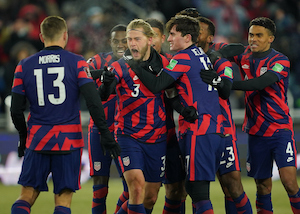
I have one buddy, his name’s Will Boni. So we hit it off right away, just the younger kids super into sports, going to play college soccer, and just the vulnerability of conversation ways that I felt like I maybe struggled in high school. Looking back, he always tells me now, like, “It’s so cool that you just swing by and pick me up to grab a milkshake. I was just a ninth grader. And you’re playing professional soccer, just scored on the weekend and got your first national team call up, and yet you’re just coming over to go play golf or grab a milkshake or something.” And I think that for him, it’s just showing it doesn’t matter what we do. It’s who we are as people that matters most at the end of the day. And I think that’s what his biggest takeaway was, it doesn’t matter how much success he continues to have, he’ll still return my calls. He’ll still return my texts. He’ll be there for me when I break up with my girlfriend. I’m there for him. And I think that goes a long way in those kinds of relationships.
“It doesn’t matter what we do. It’s who we are as people that matters most at the end of the day.” – Walker Zimmerman
Passing the Faith Along
Right now, we are going through a team Bible study with whoever wants to be involved with Nashville. And so it’s waking up at around 7:15, 7:20, and we’re going to the book of John. And so just kind of answering some questions, doing some reflections on some scripture. And it’s just been a great time, honestly, for me the past couple of weeks, of starting my day like that, because I feel like in the past, it’s just gets away from me. And if I don’t just start off my day in the morning, then it’s more difficult later on as things kind of pile up.
I think Jesus Calling did such a good job of simplifying bigger topics, bigger issues, making them easy to understand, and then providing you with just a peaceful truth about who God is. Sometimes it can be topical, and can help you with something that you’re struggling with, but it’s just a peaceful way to connect with the Lord early in the morning or late at night, whenever you you choose to do it, and sets that framework through the whole day of knowing that you’re not going through this day alone. You’re going in there with a relationship with Jesus and it’s all going to be okay. I think it does a really good job of setting that tone for people.

I think one of the biggest things I got from leading a small group and doing some teaching for high schoolers and middle schoolers was just an opportunity to relate to them and try and ask them things that would be thought-provoking. “How can I be there for you as a resource, fully trustworthy, and we can just be as open as you want to be and try and have that relationship?” And it was really rewarding. I was with a group of guys from seventh grade all the way through their senior year of high school because I was there for five years. So just watching them grow up, kind of go from boys to men, was really special and I think played a big role in my growth as well, just being in that kind of mentorship role.
Narrator: Walker closes his time with us by reading a prayer from the Jesus Listens prayer devotional by Sarah Young.
Walker: Jesus Listens, September 1st:
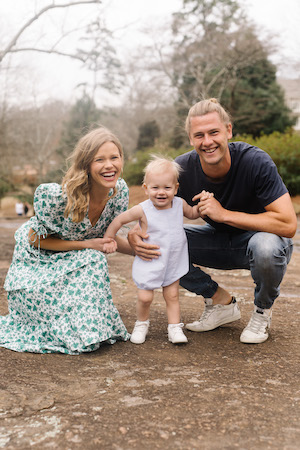
Glorious Savior,
As I walk with You through this day, help me to keep trusting You to provide the strength I need, moment by moment. I don’t want to waste my precious energy wondering whether I have enough stamina for today’s journey. Instead, I can rest in the knowledge that Your Spirit within me is more than sufficient to handle whatever comes my way.
Lord, You provide everything I need. In quietness (spending time alone with You) and confident trust (relying on Your adequacy) is my strength.
In Your powerful Name, Jesus,
Amen
Narrator: To learn more about Walker and follow his career, head to www.walkerzimmerman.com, and follow him on social media.
Stay tuned to David Kim’s story after a brief message.
Listen to inspirational prayers with the Jesus Listens audiobook
Jesus Listens is the prayer devotional book from Sarah Young helping people everywhere deepen their relationship to God through prayer. Now you can hear these daily prayers with the Jesus Listens audiobook!
The Jesus Listens audiobook contains daily, short, heartfelt prayers and is the perfect way to connect with God on a daily basis that fits your busy schedule. You can listen from anywhere—during a morning commute, an afternoon walk, or as part of your regular meditation and reflection time.
Check out the Jesus Listens audiobook on Audible, Apple Books, or wherever you listen to audiobooks.
Our next guest is David Kim, a discipleship and formation pastor at WestGate Church in Silicon Valley. David opens up about his experiences with loneliness as a Korean American immigrant, and how a moment of compassion from a teacher when he was just a boy inspired his research into the concept of belonging, and cultivating true community in our disconnected world.
David Kim: Hi, my name is David Kim, and I’m the discipleship and formation pastor at WestGate Church here in Silicon Valley, California. I’ve been pastoring for twenty years now, and I deeply care about the intersection of spiritual formation, theology, mental health, and Christian community.

I was born in South Korea, and I came to the States when I was ten years old. My father’s a pastor, and he wanted to really study in America and get his doctorate. And so we moved and I was pretty excited to go to this land of opportunity. I’ve heard about it all my life, but I wasn’t prepared as a ten year old boy for all the changes that would happen as I moved to the States: the language, food, culture, neighborhood, my friends, my church community. I mean, everything changed right before my eyes, and I didn’t know how to navigate them all. I felt so lost, confused, and alone, and I began to slowly experience this deep pain of loneliness.
And so the way I coped with my loneliness was I started to get involved in playing a lot of video games, eating a lot of food, watching a lot of pornography, and all these other things to soothe my pain of loneliness.
And looking back, I think what I was trying to do was just distract myself from experiencing all the pain of what it means to be alone in America, and navigating all the different ways in which I had to face my new world.
“I think what I was trying to do was just distract myself from experiencing all the pain of what it means to be alone in America, and navigating all the different ways in which I had to face my new world.” – David Kim
The Impact of a Loving Teacher
So one of the first things that really shaped and helped me with my journey of belonging is that I had a teacher, her name was Miss Stratuli. She came into the classroom and she realized that I had no idea what was happening. It was the first day of class, and I couldn’t understand anything that she was saying. And I remember her giving us this incredible exercise on the second day. She handed out these white pieces of paper, and she asked everyone to draw an item or two in the classroom. And she had two black lines, and one of the first lines, she asked them to write them in English, and she asked me to write that item in Korean. Afterwards, she walked around and she pasted them all throughout the classroom, these drawings that we’ve just spent a few hours doing. And she left that throughout the classroom for the entire school year so that I was able to identify and say what those items were in English.
And at that moment, I really felt seen, known, and cared for. And this is what we really want, for someone to come alongside and say, “I see you, you’re not alone, and we can do this together.” And that really shaped me and my journey of belonging.
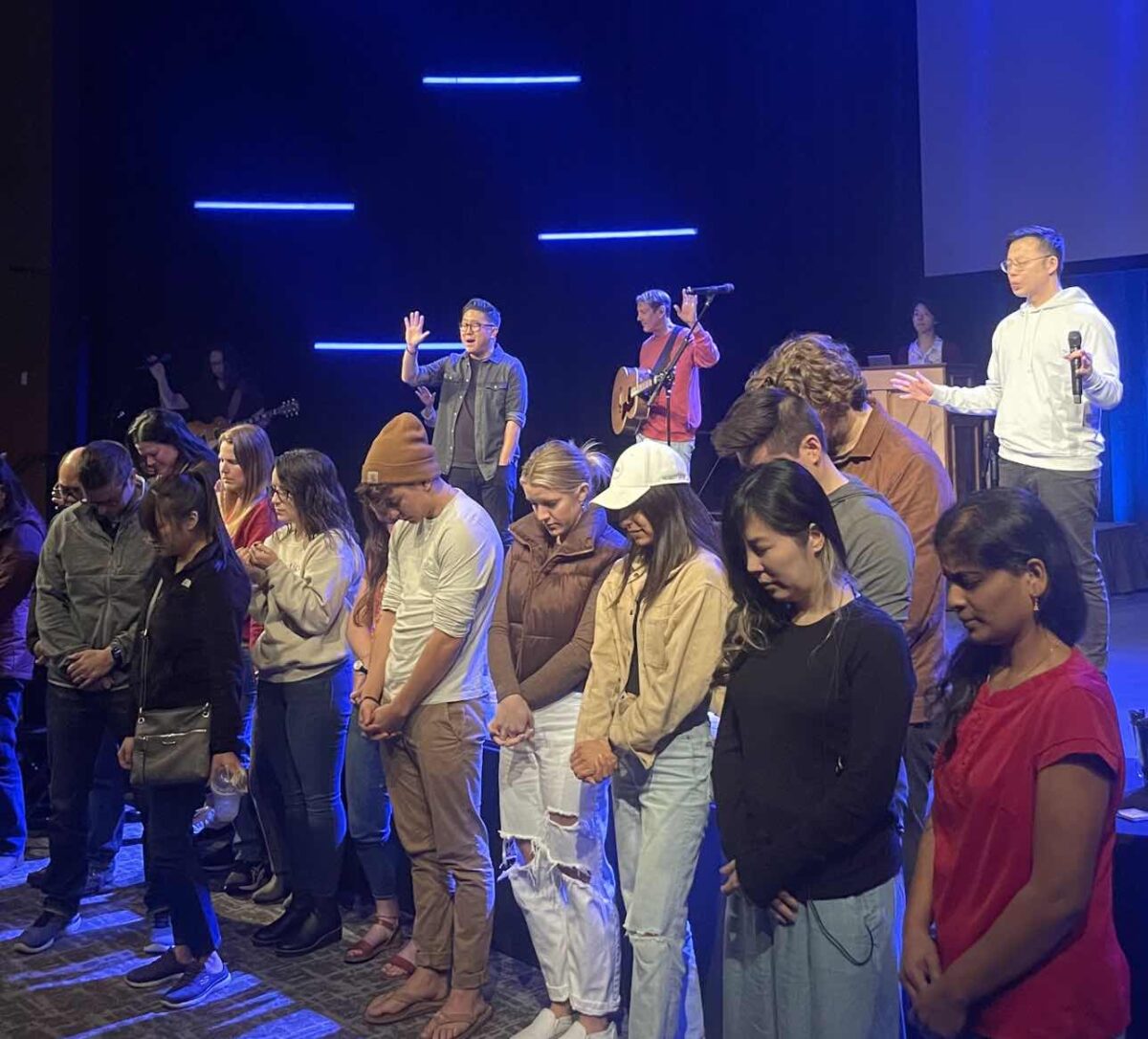
And so when I’m talking to people, instead of getting easily distracted and being self-focused, really, and self-centered about what I need to get through throughout the day, I try to see what they’re sensing, what they’re feeling, what might be something that they may need. And I try to lean in, and as I do, I believe that they are met with an incredible sense of belonging and care.
“When I’m talking to people, instead of getting easily distracted and being self-focused and self-centered about what I need to get through throughout the day, I try to see what they’re sensing, what they’re feeling, what might be something that they may need. And I try to lean in, and as I do, I believe that they are met with an incredible sense of belonging and care.” – David Kim
5 Practices for Cultivating Community in a Disconnected World
In my own journey of belonging, I’ve experienced so much loneliness as an immigrant. But I realized that as I’ve been pastoring for twenty years, that this is not just my own immigrant journey, but this is a journey for many of us. We’re realizing that we’re more lonely than we’ve ever been.
And for some of you, you may have moved to a new location. You have a new job, or you just joined a new church community, or you lost a friend, or you’ve been part of this community for a long time, but you’ve been busy or not that really involved and you feel like you’re still alone and no one really knows you for who you are. And in this culture where we’re so busy and hyper mobile and we can tend to be easily isolated, many of us long to belong, but we just don’t know how.
“In this culture where we’re so busy and hyper mobile, and we can tend to be easily isolated, many of us long to belong, but we just don’t know how.” – David Kim
I’ve begun to realize that even in Christian community, we may be gathering on a Sunday or attending small groups and checking out events here and there. I mean, God made us in community for community. And while we may be hanging out together or attending church together, I realize that it takes way more than just being around people. We can actually be around a lot of people and still feel alone.
And so these five practices—what I call priority, chemistry, vulnerability, empathy, and accountability—these five practices are practiced in such a way in order so that we can develop intentional and healthy relationships, so that we can forge the communities that we’ve been all longing for where we are truly seen, known, and loved.
Practice 1: Priority
The first practice is priority. We are living in a culture where we don’t really value relationships as much, and we can actually live throughout the entire day not seeing anyone. We have access to our phones. We can order food online, we can talk and chat with others, and we can live throughout the week without meeting anyone. And we begin to believe the lie that we can actually live our lives alone. And so priority is a reminder to intentionally prioritize relationships that God has given in our lives and for us to intentionally reach out and build friendships. And priority is the first practice in which we build our community.
“[The priority practice] is a reminder to intentionally prioritize relationships that God has given in our lives and for us to intentionally reach out and build friendships.” – David Kim
Practice 2: Chemistry
And once we do, we move on to chemistry, and chemistry is really important. Many of you listening may say, “Hey, I don’t know if chemistry is Christian. Doesn’t the Bible talk about how God says we have to love everyone and care for the whole world?” And yes, that is true. But if you look at the life of Jesus, He was able to love the world, and He had the twelve disciples, and He was able to care for the twelve disciples, but still lean into the three disciples—the inner three that we call them—that he was really close to. And He wasn’t committing a sin of favoritism by leaning into the three that He had greater chemistry and connection with in His most difficult times and key moments of His ministry, like the guardian or the transfiguration. He was with the three. And so there is a way in which we can build and love and care for our entire community and still forge the few that God is bringing greater connection, whether that’s through shared values or shared interests and things like that, we are able to lean in and build chemistry.
“There is a way in which we can build and love and care for our entire community and still forge the few that God is bringing greater connection, whether that’s through shared values or shared interests and things like that, we are able to lean in and build chemistry.“ – David Kim
Practice 3: Vulnerability
Once we do, we get into building our community through vulnerability, and this one’s really hard. Vulnerability is something that is really scary for many of us. We have opened up before and people have taken advantage of us, or we’ve been gossiped upon. And I understand that vulnerability can be difficult, but unless we open up and reveal the truest versions of ourselves, how can we be really seen for who we are? So once we prioritize our relationships and see some chemistry within our context, we are able to now open up and be honest with who we are, what we’re struggling with, and we are met with deeper connection.
I think about the challenges of vulnerability in our current climate. For me, I’m a Korean, American, Christian, male pastor. I mean, think about that. As an Asian, there’s a lot of shame opening up about your family history and what that may do with your community. [As an] American, we have this belief that we can do this with our own strength. I don’t need any help. And so vulnerability can be seen as a weakness. As a Christian, we don’t want to open up and be judged for some of the things that we might be thinking or struggling with. [As a] male, there is a societal pressure for men to not share our emotions and feelings, and so we cover up. [As a] pastor, it’s hard for pastors to really be honest about what they may be going through because of how others may see how pastors are really, truly living. And so just myself, I have five different challenges as I face vulnerability. But the invitation from God is to be honest and real. And as we do, we are able to truly open up and be seen for who we are.
“The invitation from God is to be honest and real. And as we do, we are able to truly open up and be seen for who we are.” – David Kim
Practice 4: Empathy
As we become vulnerable, we get into empathy. We’ve all been in places where we’ve opened up and it was met with silence or lack of care, and empathy is saying, “I see you, I feel you, and I’m going to lean, I’m going to cry, I’m going to celebrate with you and what you’re going through.” And that really forges the community that we’ve been vulnerable with.
Practice 5: Accountability
And then we get to the final piece in our Christian community of belonging, which is accountability, that we are called not just to build a community where we can just connect, but that we are calling one another to become all that Jesus is inviting us to be.
We as Christians tend to lead one or the other. We are either more truth-focused or we are grace-focused. And the invitation is to hold both truth and grace, both truth and love together. And we don’t do that very well as we lean into friendships. But the invitations to hold both of them together and lean in—and as we do, what others feel on the other side is that, Wow, you deeply care about me and you care about some of the things that I’m working through. And you care enough to lean in with truth and love, because both of them require time, energy, and resources, and even sacrifice potential awkward conversations and moments. But when we do, we believe that real, healthy, and deep friendships could come out of that accountability.
I love the book Jesus Calling and the invitation to take our relationship with Jesus seriously. And through that relationship, God has given us all that we need to really live this world. And I believe that as we connect with God every day, God increases our capacity to listen, care for others. Because often if we are left to ourselves, we turn inward.
For me, I’m often self-centered and self-focused, but if I spend time with Jesus, Jesus gives me the eyes to see that I live this in world not for myself, but for Jesus and this world. And I believe that as I connect with Jesus, He also reminds me that oftentimes in my own loneliness and in my own struggle, Jesus is saying that “I have never left you. I am always with you. I am always beside you. And I am that ultimate friend that you need in this world.” And so that’s the invitation for us to really connect deeply and draw our well from our friendship with God.
“I’m often self-centered and self-focused, but if I spend time with Jesus, Jesus gives me the eyes to see that I live in this world not for myself, but for Jesus and this world.” – David Kim
This is a prayer from Sarah Young’s prayer devotional, Jesus Listens, on April 19th:
All-knowing God,
You have searched me and known me. You understand my thoughts from afar, and You are intimately acquainted with all my ways. How thankful I am to be fully known by You!
I’ve been learning that my intimate relationship with You is a powerful antidote to feelings of loneliness. Please remind me to voice my prayers to You whenever I’m feeling alone or afraid.
In Your royal Name, Jesus, Amen
Narrator: Be sure to check out David’s new book, Made to Belong: 5 Practices for Cultivating Community in a Disconnected World, at your favorite retailer.
If you’d like to hear more stories about building community and relationships, check out our interview with Seth and Heather Thompson Day.
Next time: Karen Kingsbury & Tyler Russell
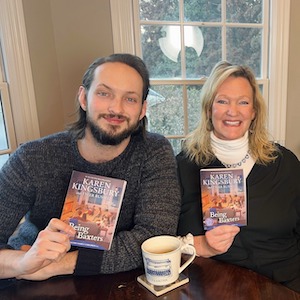
Next time on the Jesus Calling Podcast, we’ll hear from beloved Christian author Karen Kingsbury and her son Tyler Russell, who share how their prayers guide each of the stories that they’ve written together.
Karen Kingsbury: God has been so faithful. It’s just incredible. He’s so sincerely faithful with His Word that when it says that if anyone lacks wisdom, ask, and He will give generously to all without finding fault. And that is exactly what He has done, like step by step by step.
